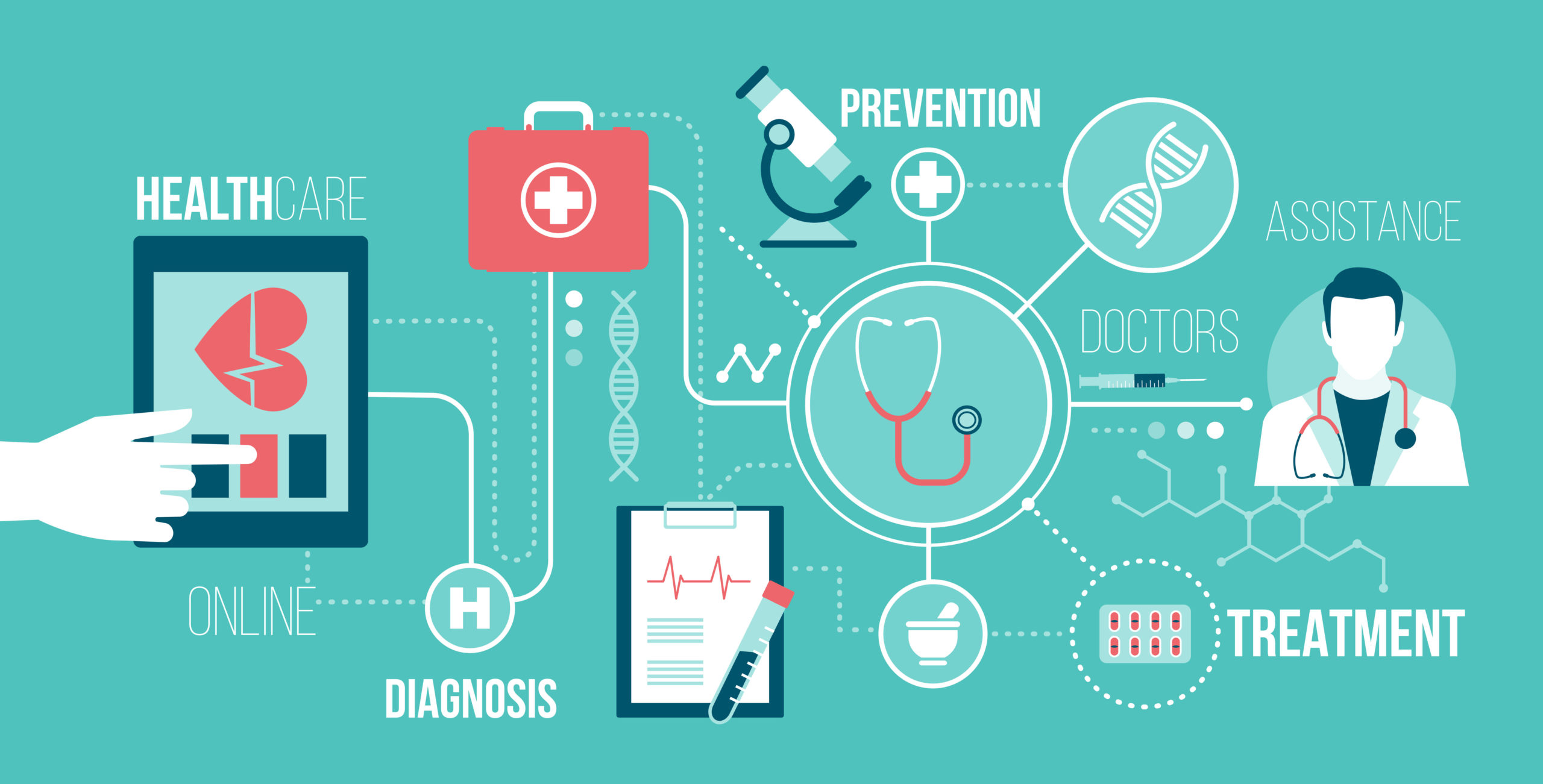The creation of the ARP Webon Netherlands HAP network
Introduction

HealthCare Access Points (HAP)
In 2015 the Dutch mutual investment fund called Secerno HealthCare Real Estate Fund B.V. is initiated, as a “Real Estate Investment Trust” (REIT), focusing on investments in real estate leased by Healthcare providers in The Netherlands. During the acquisition of assets for this investment fund, the focus is on fully occupied healthcare service buildings leased by several healthcare providers who deliver services to the local community. We call these service buildings Health Care Access Points (HAPs). These types of facilities have tenants such as :
- General practitioners
- physiotherapy practice
- psychologists
- pharmacy
- healthcare aid shop
- recovery hotel
As real estate investment managers, during the international search for investors for this fund, by the founders Machiel van Duijn and Barry Kumarappan serious interest is shown by investors in Mumbai India in 2016. While having discussions with many investors and healthcare providers in the United States of America, England and India, the focus of the discussion tended towards investors and healthcare providers in Mumbai, Pune and Kolkata in India, Dubai and Bangladesh as a starting point. A common factor that becomes apparent is the demand for Healthcare Service Centers as seen in The Netherlands appears very strong in these locations as well.
Early 2018 Machiel van Duijn and Barry Kumarappan founded ARP Webon Netherlands B.V.; to develop the software and systems for these Access Points. This leads to having a Shared Service Center concept at the heart of the Healthcare Access Point (HAP) . This HAP facilitates the best possible healthcare outcome to be achieved. The concept of the ARP Webon Netherlands Healthcare Access Point (HAP) is born.
HealthCare Shared service center combined with Technology

A primary goal in every country at this time is to provide Universal Health Coverage (UHC). Most solutions to achieve this require a seamless link between technology and healthcare. Advancements in Technology at this time facilitate meeting these challenges. Any solution requires a Global foundation, taking into account factors, for example , such as accessibility, affordability and quality. Eventhough these solutions are at an early stage the rate of adoption is fast, driven by the size and urgency of demand in healthcare sector. The resulting scale and impact to the healthcare sector is very high.
One of the key building foundation blocks is the use of Electronic Health Records (EHRs). Based on this Solutions and systems are built on this to improve care, reduce errors and achieve high efficacy by aligning the clinical care processes supported by linked data to improve outcomes, measured by quality of life.
The underlying technical architecture of the solutions is cloud-based incorporating mobile applications that support provider and patient interactions based on EHRs. The data gathered through EHRs, over a period and in real time using powerful analytic models is used to improve processes and achieve better clinical and quality of life outcomes.
The HAP healthcare concept increases awareness of health and wellness issues, this is done in a way so that patients actively play a major role in the overall process of their own care. Healthcare processes aim to improve prevention and continuous monitoring of health. Technology such as Artificial Intelligence (AI) enabled recommendation engines help individuals to make choices. The objective is to maximise Outcome driven personalised care, this is only possible by use of technology. This is critical worldwide due to the rise of chronic diseases and global epidemics. The aim is to deliver personalised care depending on the illness and psychological make-up of the patient to achieve the highest efficacy and outcome possible measured by quality of life.
Key Current and Emerging trends

Globally there is a change in the healthcare ecosystem wherein small clinics co-exist with large healthcare organisations and large sophisticated hospitals. The trend is towards more homecare, ambulatory and emergent care services outside of the hospitals. In addition the approach is characterised by a higher preventive component integrated with the curative component.
Some of the current and emerging technology making this possible is :
- Personal IoT(IoMT Internet of Medical Things)-based health monitoring devices used to track the health of individuals in real time.
- Blockchain used to populate and maintain EHRs, also used to link to other services like payments and insurance.
- Processes Embedding AI to assist physicians, health workers and caregivers in triage, diagnosis and treatment, helping doctors decisions for example : determining if a lesion is cancerous.
- 3D printing for replacement organs, exoskeletons, making a cast.
- Increase use of Ingestible pill monitors, bio stamps, nutrition sensors,.
Technology and AI (Augmented Intelligence) vs Artificial intelligence is used to enhance the doctors and medical professionals not replace them.
The ARP Webon Netherlands B.V. HAP concept

Healthcare Shared Service Center (Cloud Based Engineering)
In India there is an enormous fast growing demand for healthcare services. A critical success factor to meet this demand and to maintain quality of healthcare outcomes is to have an excellent definition of processes. Also an integration of the latest best practices, are built in the process. These factors combined with additional supply of medical equipment and its maintenance, which are operated by trained specialists in order to achieve the best results. The Health Care Access Point concept fits well to meet this demand.
The Healthcare Access Point makes a positive contribution to the Healthcare demands. The result is that providers/customers and the surrounding community of a HAP have access to:
- A variety of specialists such as general practitioners, physiotherapist practice, pharmacist, psychologists, dermatologists, diet- and nutritional advisors
- The HAP is also linked to a Homecare organisation and also including a fitness centre (also used by the physiotherapists in the HAP).
- Other Facilities as a Medical aid-, Nutritional- and Health shops
- A recovery hotel with a limited numbers of rooms is also integrated in a HAP.
Because of these broad variety of health providers the HAP encourages its visitors to live a healthier life and apply a regime to prevent illnesses and diseases. This results in a general increase in quality of life.
The heart of the HAP is the Shared Service Center, which controls and manages the software and systems, developed by ARP Webon Netherlands B.V. focused on :
- Patient outcome management systems, that work across multiple channels providing a 360 View of the healthcare activities of a patient. Relating to Conditions, Case management and ‘promote the approach to be proactive’.
- Treatment plan and protocol generator to highlight and manage the best journey in the HAP to achieve and manage the best possible outcomes given a patients’ condition.
- A core component is a HAP Information Portal (HIP). This allows the health care providers with their patients access to a central point of international information (International Healthcare Global Network). This enables communication between patients and healthcare providers on an international scale. Also the HAP Information Portal (HIP) allows mobile monitoring by their specialists at home.
- Connection to the International Healthcare Global Network gives the ability to explore international healthcare knowledge. This improves the quality of care to the standard international level and adds more emphasis on combining healthcare prevention and care.
The Healthcare Access Points (HAP) Franchise model by ARP Webon Netherlands.

The concept behind a HAP franchise and its management is outlined by key documents the ‘HAP Manual Introduction’ and ‘HAP Terms of Service’. This is part of the franchise agreement between ARP Webon Netherlands B.V. and the franchisee who runs and operates the local HAP.
The Franchisee is a legal entity which governs the HAP and its Shared Service Center.
The specialists in the HAP are members of this legal entity (and can also be shareholders). The specialists :
- Lease their space in the HAP building for their own practice. At the heart of the floor plan are the service area with the reception and the waiting room for the visitors is located.
- The Shared Service Center also facilitates the HAP members such as managing the specialists’ agendas and their administration of the services they provide.
- This standardises processes (best practices) and ensures maintenance of a high quality and maximum user satisfaction.
Investor agrees the concept (MoU) and becomes a Master franchisee
ARP Webon Netherlands B.V. has reached an Understanding (MoU) with a party who wants to roll out a network of HealthCare Access Points. A quick launch of the HAP Network is needed to gain sufficient market share to ensure the quality of the Franchise roll out, and minimise duplication by others.
The understanding is that the country-initiator signs a Master Franchise Contract with ARP Webon Netherlands BV. This party wants to sign the Master Franchise contract for India, United Arab Emirates and Bangladesh. Together with ARP Webon Netherlands this party wants to :
- Setup a team of healthcare professionals in each country in order to acquire HAP locations and management. and commit specialists as members for each HAP.
- Finalise the legal setup from the Franchise contract, permits etc for each country
The first phase of the roll out plan is the setup of 50 – 60 HAP’s in strategic locations in India, Bangladesh and UAE. The phases of the rollout plan incorporate the HAP software solution from ARP Webon Netherlands BV, as part of the Franchise contract.
Healthcare Access Point (HAP) Franchise model In India

It is estimated that the Indian healthcare industry will grow from $160 billion in 2017 to $280 billion by 2020.
Challenges :
- Population in excess of 1.3 billion scattered across urban and rural India
- According to a report by the United Nations
- 75 per cent of all healthcare infrastructure including medical specialists and doctors are concentrated in urban areas where only 27 per cent of the Indian population live.
- Private hospitals and quality healthcare are limited to urban areas.
- Approximately 716 million or 72 per cent of the population stay in rural areas with a chronic lack of primary health care facilities.
- Hospital bed density stands at 0.7 per 1,000 people, which is significantly lower than the World Health Organisation (WHO) guidelines of 3.5 beds per 1,000.
A Healthcare shared service centre (Healthcare Access Point) Franchise concept and organisation combined with the use of Technology is a good combination to help meet these challenges.
The ARP Webon Netherlands HAP franchise starter kit consists of :
- The “ARP Webon Branded” opensource Postgres Database
- Access to the HAP Information Portal (HIP) and the Global Healthcare Specialist Network
- Electronic Medical Records system.


-
- ONC Complete Ambulatory EHR Certified
- Patient Demographics
- Patient Scheduling
- Electronic Medical Records
- Prescriptions
- Medical Billing
- Clinical Decision Rules
- Patient Portal
- Reports
- Security
- Multilanguage Support
- Electronic Handheld and Mobile devices
The initiator or manager establishes the local HAP in a building, accommodating the members and the Shared Service Center.
Initiation of an International Healthcare Investment Fund

When the proof of concept phase is completed and carefully monitored and managed, ARP Webon Netherlands B.V. intends to initiate an International Healthcare Investment Fund (REIT) which finances the complete roll out in India, Bangladesh and UAE.
International fund organisation


